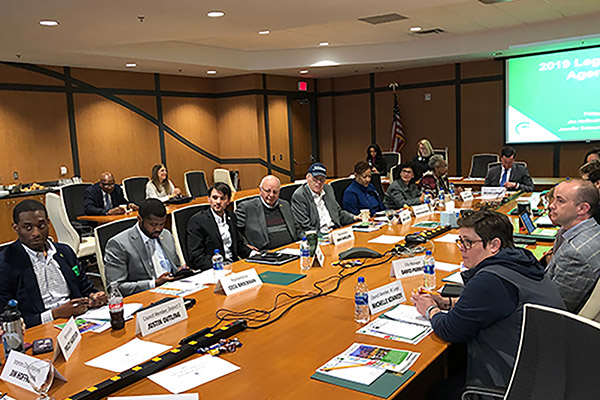The Greensboro City Council and the Guilford Legislative Delegation had a cordial meeting at the ACC Hall of Champions in the Greensboro Coliseum Complex on Friday morning.
Afterwards several legislators and councilmembers said it was the most productive meeting of the two groups they could remember.
Assistant City Attorney Jennifer Schneier went over the city’s legislative agenda, a list of 11 items that the City Council would like to see passed in the current session of the legislature. The state representatives and senators who all represent a part of Guilford County asked a lot of questions, some of which couldn’t be answered, but overall the discussions were about policy and procedure.
Even Councilmember Sharon Hightower who tends to talk nonstop at City Council work sessions and meetings, didn’t try to take over the meeting. Hightower kept her comments short and mainly to the point.
No promises were made, but some of the items did seem to garner support from the Republicans in the delegation. Raleigh is extremely partisan and even though the Republicans don’t have veto proof majorities in both houses as they did in the last session, they do still have majorities. As the city keeps learning the hard way, if you want a bill to pass you need to have a Republican sponsor that bill.
The Democratic legislators can ooh and ah over all the great things the Democratic City Council wants to do, but nothing passes the state legislature without Republican support.
State Sen. Jerry Tillman who is one of the Republican powerhouses in the Senate asked a few questions about what some of the requests would cost, like providing healthcare benefits for former City Councilmembers. He insisted that somebody was paying for it but when told no state money was involved, he seemed satisfied with the answer.
If the City Council can get that bill through the legislature, being a City Councilmember will move up again in compensation. In 2016 the City Council gave itself a 60 percent raise and if former councilmembers can stay on the city healthcare, that makes the job worth even more.
The meeting also revealed two potential rifts on the City Council that really had nothing to do with the legislature. An item on the list is requesting that the NC Department of Motor Vehicles refuse to renew the license plates for vehicles that have unpaid Greensboro parking tickets.
Since the city is inexplicably unable to collect parking ticket fines, it wants someone else to collect them for it, in this case the NCDMV. There was some question as to whether the NCDMV wanted to take on the job of being a collection agency for Greensboro, but the question was not resolved.
However, that led to comments by City Councilmember Michelle Kennedy and state Rep. Amos Quick about how they were trying to have the state pass legislation so that a person’s drivers license was not revoked for a failure to pay traffic ticket fines. They said it was a class issue.
Tillman asked, “So if you’re poor you don’t have to pay your tickets?”
Quick said that there would be other sanctions put in the place of having the drivers license revoked. What was not clear was if the sanctions would be different for everyone, or if Quick was talking about two sets of sanctions, one for people who could pay a fine and one for those who couldn’t or wouldn’t.
Rep. Pricey Harrison going back to the parking ticket issue said, “Some of us have concerns about people ending up with their license plate being invalidated.”
It didn’t sound like this was one that was going to fly with the legislators and is certainly opposed by at least one councilmember, Kennedy. It wouldn’t make much sense to pass legislation so that people could keep their drivers license after they fail to pay traffic tickets and then invalidate their license plates because they haven’t paid their parking tickets.
It seemed to be ignored but Councilmember Nancy Hoffmann made a good suggestion for the city, “We should look at some reduction in the parking fines as well.”
Kennedy also gave a big push for funding a medical detox facility in Greensboro. The funding would have to go to Guilford County because Guilford County not Greensboro funds public health.
And there was a request for funding for the Cure Violence program which was not on the legislative agenda. In Durham, the only city in the state with Cure Violence program, it is funded by the Durham County Health Department.
At this point Councilmember Justin Outline noted that the city was not responsible for funding human services.
Both Cure Violence and a medical detox facility fall into the human service category.
All nine members of the City Council were present and those attending from the Guilford Delegation were state Sens. Michael Garrett, Gladys Robinson and Jerry Tillman and state Reps. Cecil Brockman, Ashton Clemmons, John Faircloth, Jon Hardister, Pricey Harrison and Amos Quick.
State Sen. Rick Gunn from Burlington who represents a portion of eastern Guilford County was the only member of the Guilford County delegation who wasn’t present.

